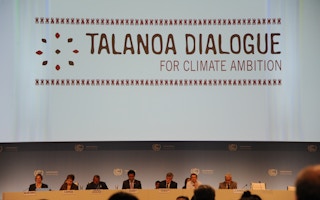Not millions, not billions, but trillions.
This is the amount of funding and investment the world needs if it is to protect itself from the devastating impacts of climate change, said Patricia Espinosa, executive secretary of the United Nations Framework Convention on Climate Change (UNFCCC), at the Bonn Climate Change Conference yesterday.
“Let me put it this way. Trying to address climate change at current financing levels is like walking into a Category 5 Hurricane protected only by an umbrella,” Espinosa said at the opening of the Talanoa Dialogue yesterday.
All eyes are on the Talanoa Dialogue, the first meeting which will see government negotiators, business and civil society come together to discuss how to raise the emissions reduction targets set forth in each country’s Nationally Determined Contribution (NDC).
NDCs are the pledges countries made under the Paris Agreement that outline what actions they will take to reduce greenhouse gas emissions post 2020, or when the Agreement begins implementation.
“
Trying to address climate change at current financing levels is like walking into a Category 5 Hurricane protected only by an umbrella.
Patricia Espinosa, executive secretary, United Nations Framework Convention on Climate Change
Revising national emissions reductions targets are a critical part of the Paris Agreement, in part because the emissions reductions currently pledged through NDCs are not enough to keep global warming below the 2-degree threshold.
Espinosa warned that this could mean more chaos for those who are already suffering the consequences of extreme weather. “Let me be perfectly clear about what that means. A 3-degree Celsius temperature rise will lead to nothing less than global destabilisation,” she said.
“It will cost lives, raise competition over resources, and increase instability and conflict, especially in places already undergoing economic, political, and social stress,” Espinosa added.
Espinosa said more funding is needed to support the countries as they scale up emissions reductions in their NDCs, and the current commitment from developed nations of $100 billion a year is simply not enough.
Aside from funding for climate mitigation and adaptation, negotiators in Bonn will, over the next days, debate about a new finance mechanism called loss and damage, which refers to compensation for impacts of climate change that countries can no longer adapt to.
“You can and must do more. You can help turn that umbrella into something solid, strong, and sustainable,” she urged.

















